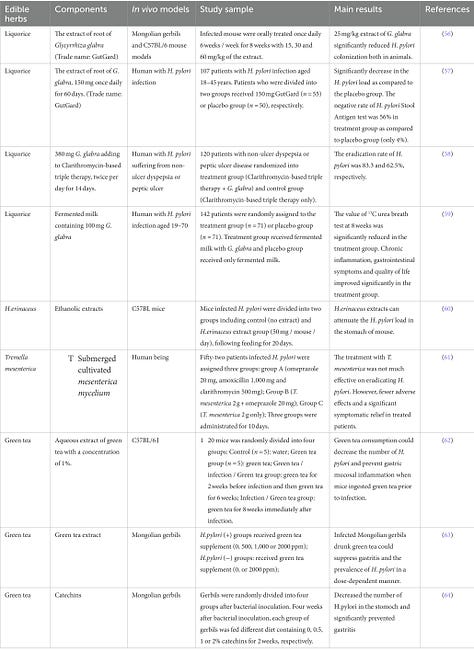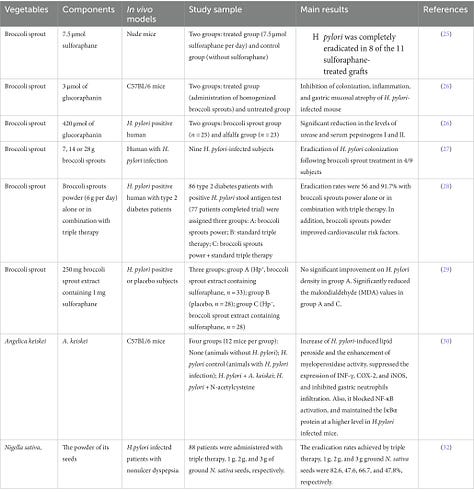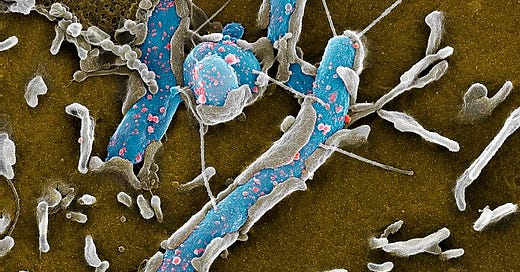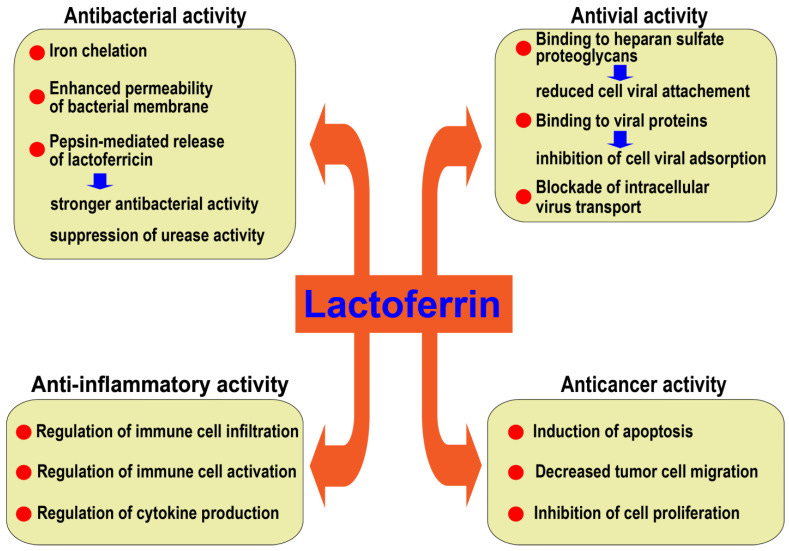In my last article, covering the detrimental effects of SARS-CoV-2 on the lining of your throat and digestive system, I left an overview of an article on how Epstein Barr Virus will cooperate with H. pylori to cause similar effects, a new relationship in which a common, often latent virus cooperates with a bacteria to induce gut damage and neuroinflammation, this last part over time.
A few readers asked me for H. pylori-related supplement suggestions, and a few others asked me to write an article about it, which is what I intend to do now. As a brief introduction, H. pylori is somewhat of a common gut pathogen. In the vast majority of cases, your gut may have pylori (a process called colonization), but you remain asymptomatic. Your microbiome, overall immune system, and other factors will keep it in check.
Failure to keep it in check leads to the persistent growth and, consequently, the progression of symptoms ranging from discomfort to gut inflammation, and even ulcers in the most severe cases. To be honest, literature on H. Pylori and how to deal with it is plentiful, not only scientific but also found on websites and in blog-style articles; thus, this is just my perspective.
To avoid an overcomplicated, science-heavy article, I will skip the science, but in case you are curious, a lot of the damaging pathways from H. Pylori share remarkable similarities with SARS-CoV-2 at many stages. Two distinct classes of pathogens, but similar ways of dealing “damage”.
Since a very early age, I had an inclination for understanding complex systems, thus, I work from a first-principles perspective. Meaning even though our bodies are one of the most complex biological lifeforms there is, everything operates from simpler functions. Primary functions enable each cellular step, physiological cornerstones that have a greater impact, if you will. This is the reason it shares remarkable similarity in how to deal with SARS-CoV-2 damage, and many other conditions.
The basics of H. pylori are “simple”. It continually causes inflammation in your gut, which affects the gut mucosa, the lining inside the gut, and this, in turn, causes many of the symptoms. Addressing the damage and its inflammatory process is a necessary first step.
As many bacteria H. pylori will thrive on iron and can “steal” your iron, it loves high amounts of glucose around your body. One of the main damaging mechanisms the bacteria possess is producing ammonia, and this will be important later on.
I will preface my suggestion with a comment from my last article, maybe this will help most people from the get-go.
As with many, if not most, modern illnesses, H. pylori infection is strongly associated with the microbiome, a weird game of chicken and egg, what comes first, the infection or the changes in the gut. Regardless, the gut microbe population plays an intrinsic role in dealing with the bacteria. Supplementation is necessary because when your gut lining is damaged or inflamed, you do not absorb nutrients as efficiently as other people.
To preface my suggestions, here is a great paper on the effects of different foods on H. pylori. The list is in the images below.



Microbiotics
One of the best supplements overall, and one of your first steps should be L. Reuteri. It is powerful enough to beat antibiotic treatment alone when used with Pantoprazole. As an adjunct treatment (Reuteri + other treatments), it lowers side effects of drugs, and drastically increases the eradication of Pylori. The strain DSM 17648 seems to perform particularly well in multiple trials.
Your second recommendation has no direct evidence on treating H. pylori, but it is one of the most, if not the most important, microbes in our bodies. Akkermansia Muciniphila, and this is one of the most impacted microbes in the gut after a SARS-COV-2 infection, lasting 5+ months. Certain people suffering from Pylori will have lower levels of Akkermansia.
Akkermansia alone will lower intestinal inflammation, the stress it causes, and promote the healing of the gut. “A. muciniphila as a probiotic can help maintain intestinal and metabolic health amidst the broad array of modern stresses that can promote chronic inflammatory diseases.”
Bifidobacterium spp. possess one of the strongest eradication effects. If you decide to use probiotics, test each separately.
Supplements, amino acids
Berberine can help deal with H. Pylori, Berberine + drugs can be used effectively as harder, stronger treatments. Berberine will also increase Akkermansia in the gut by itself. Berberine not only modulates your glucose metabolism and beneficially changes your microbiome, but it is on itself a potent anti-inflammatory and anti-oxidant, via a myriad of pathways, it also modulates your immune system, and acts as an antimicrobial (it is powerful enough to treat acne).
One of the few drugs I recommend is the almost perfect analog to Berberine. Metformin has a myriad of effects in the body, including potent immuno-modulatory capacity. It acts as an anti-inflammatory indirectly, it modulates glucose levels in your body, and, on its own, can inhibit the development of H. Pylori-associated gastritis, among other effects on Pylori.
Lactoferrin. Lactoferrin should be one of your first options, while pricey in most countries, it has one of the best cost-effectiveness to treat many, and I mean many, conditions. It has an effect outside, inside your cells, it is a potent anti-inflammatory, immunomodulator, and antimicrobial. Lactoferrin will also bring iron to a balance, thus avoiding all sorts of nasty bacteria from using it and fueling their growth.
Vitamin D. It would be easier to write about what Vitamin D doesn’t do, and while it is called “vitamin”, it is a hormone. Oral supplementation can help modulate the immune system in a way that helps eradicate the annoying bug. The microbiotics, Lactoferrin, Vitamin D, are essential, I would go as far as to say “not optional”, and while I personally believe Berberine could be of great help, I leave it as optional.
All suggestions below here are optional, in a sense.
One of the most common “gut supplements” especially when the focus is on dealing with inflammation, is Glutamine. I took it for years, and I recommend it for multiple reasons. In the context of H. pylori, there is conflicting evidence. If you decide to use it, the best approach is to take it with food and with other amino acids. The rationale behind this is limiting how much “extra glutamine” there is around, thus limiting H. Pylori from “stealing it”.
Given how much oxidative stress and damage the bacteria produce, a common theme is the depletion of antioxidants in your stomach, and it depletes your master antioxidant, Glutathione. You have two choices: Glutathione, which can drastically reduce the bacteria and limit damage to the gut, or NAC. N-Acetyl-Cysteine is one of the most powerful supplements there is, with an endless “laundry list” of effects inside, outside the cells, and organ-wise, at the end of its metabolism, it becomes Glutathione
NAC can be hard on the stomach of some people, especially those suffering from inflammatory conditions, thus, I advise you to either take NAC with food or substitute it for Glutathione. Both must be paired with Glycine, as Glycine creates a powerful synergy with them, and Glycine by itself acts on H. Pylori.
I am big on synergy between supplements, and the next combination is one with the best “mileage”, as a large portion of people respond well to both. Taurine can mitigate the toxic effects of H. pylori, Taurine by itself can protect the gastric mucosa from damage, it mitigates the damage of toxins produced by bacteria such as LPS, against ammonia too. Vitamin C, a commonly suggested supplement to deal with H. Pylori is often lower in those with the condition, and it has potent synergy with Taurine. Here, I advise you to use either Liposomal C or C-Salts if you want to absorb large amounts.
Per Rahanne's recommendation and backed by research and evidence, black seed is a widely recommended natural treatment for Pylori. Here they used 6 grams of ground black seeds with 12 grams of honey, achieving a good clearance rate. Here, the authors cite multiple studies in humans with multiple approaches. Honey has potent inhibitory effects on the pathways Pylori activates, thus causing damage.
In Brazil, it is extremely easy to find high-quality honey, but in most of the first-world countries, loopholes and shady laws allow for a lot of things to be labelled “honey”, so make sure you are buying actual 100% honey. Propolis, a bee byproduct, often found mixed with honey, is also extremely powerful against H. pylori, A combination of honey + propolis + black seed (ground or oil) has high synergy. You may take honey + propolis, and later in the day black seed + thyme oil, which has very potent anti-H. Pylori effect.
Lastly, Fisetin, Quercetin's stronger cousin, can also be a very powerful tool, especially at higher dosages intermitently. Niacin can help at 50 mg per day, and the last recommendation in this section will be black garlic. A potent antimicrobial, this fermented garlic has anti-H. Pylori activity on its own, unlike Fisetin and Niacin, which have indirect effects.
Dosage for all supplements follows the best practical advice. Common sense. Your goal should be to use a higher dosage of the combination of supplements you choose, but you should always start small, which may not give you the relief you may hope for. This avoids any potential side-effect, assuring you actually use the supplements over the necessary period (at the very, very least 4 weeks, but usually it is longer, 8, 12 weeks+)
Break glass in case of emergency
This is where things get tricky. There will be a portion of people afflicted by this annoying bacteria that may simply not find relief, an eternal battle between the pathogen inducing damage and your body fighting it, which I named “not tilting the line (of recovery)”. You often won’t get worse, but you also don’t get significantly better, with a period of decline (symptoms arise).
This is where peptides come in. You may skip the supplementation at first and go straight to peptide, or pair a few supplements. The list is short, but you have to follow my recommendations.
BPC-157 → BPC is now a well-known healing peptide, produced in your gut, known to heal all tissues like nothing else. You must use the injectable form, which you buy in small vials, reconstituting the peptide and injecting it into your belly fat. This way is the most cost-effective, it acts much faster, and you get exactly what you are paying for (pills net you half of the advertised potency). Pair it will TB500 for potent synergy, often sold together with discounts.
The goal with this combination is to heal your gut enough that your body can use the energy and resources to fight the bacteria. It will also inevitably lower inflammation as a nice byproduct. Both will help your microbiome indirectly.
Thymalin → Thymalin is a potent immunomodulatory peptide, bringing your immune system to balance, incentivizing your immune system to produce immune cells that you need. If you suspect you have a weaker immune system, have trouble fighting infections, and similar dynamics, it can be of great help.
Fighting persistent infection
Another subset of people suffering from H. Pylori will have long-lasting infections, infections that will simply resist treatment, they experience moments of symptom relief, and at some point in the future, they experience another bout of infection. In this case, you have to address the source of this persistent infection.
As with most bacteria, Pylori will form biofilms, and this is both how it avoids effective pharmaceutical treatment and how it can cause sudden new infections months down the road. There are a few approaches here.
The first approach is using a combination of enteric-coated enzymes such as Serrapeptase and Lumbrokinase to destroy the biofilms, it is really one of the few viable ways to do it, this will inevitably release the biofilm contents into its surroundings, thus you must use activated charcoal hours later. It is also called activated carbon in scientific literature.
While Activated Charcoal doesn’t have a direct effect on H. Pylori, it binds to toxins like nothing else, with the biofilm contents, and especially with ammonia (it is used to remove ammonia). If you go this route, the safer approach is 1 day of enzymes + activated charcoal, and hours later, taking a higher dosage of antioxidants, and the next day or 2, you take a combination of supplements, assuring your body has the necessary tools to fight the bacteria and inflammation.
The second approach is the usual, and can be taken with everything in this list. Antibiotic treatment with a caveat. Using Ambroxol/Bromhexine, because ambroxol affects biofilms, it has antibiofilm properties and allows antibiotics to penetrate biofilms, allowing for effective clearance of infection. You can combine many of the supplements here with antibiotics for higher clearance rates, and adding ambroxol will only increase those rates.
Feel free to add your own suggestions, experience in the comments, you never know who you may be helping in the future.
If you are supporting my work, thank you ! Consider becoming one.










Hopefully, this helps some of you who were asking for these suggestions.
Thank God I don’t suffer this but thank you for sharing for those who do.